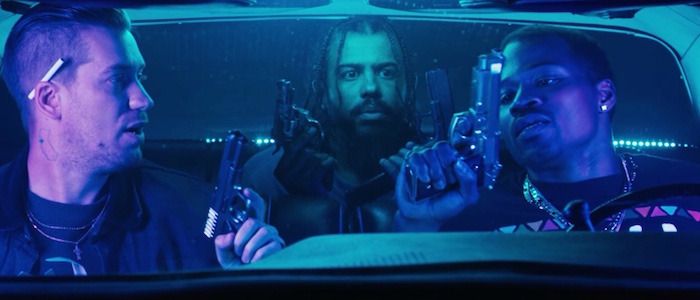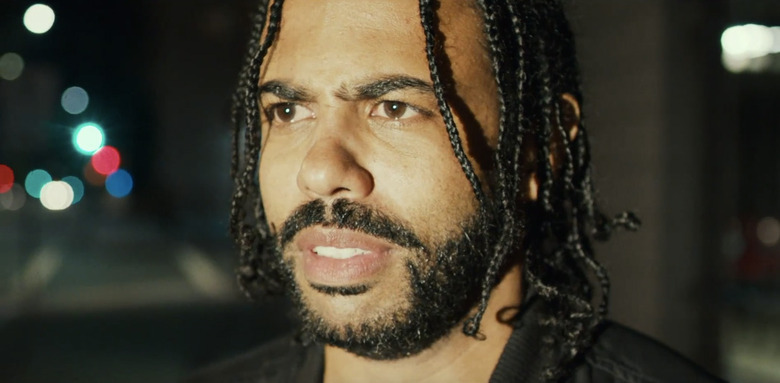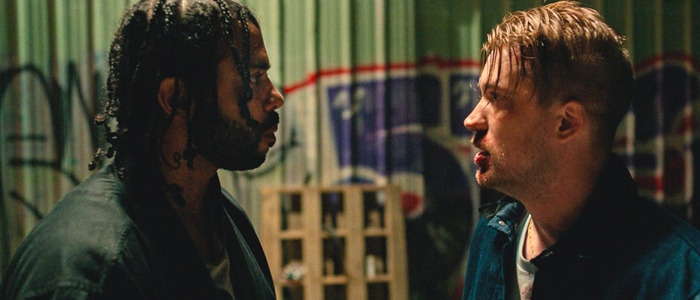Exploring 'Blindspotting' And Its Harrowing, Sobering Portrait Of Privilege
When watching Blindspotting, it's hard to tell that it is the first major film from co-writers/co-stars Daveed Diggs and Rafael Casal and the feature directorial debut for director Carlos Lopez Estrada – because it's just that good. It has rightly received tons of critical acclaim for its portrayal of Oakland, police relations, race relations and even gentrification.
And all of that deserves a closer look. This post contains major spoilers for Blindspotting.
Gentrification and Privilege
The film takes place in the final hours before Colin (Diggs) is released from probation and the sometimes dangerous hijinks he and his white best friend (Casal) get into. Both are reeling from how Oakland is becoming more and more gentrified – a running theme through the film is how the local corner store is now selling branded "green juice" in a glass bottle for $10. It even touches on how black people can't be gentrifiers and how Miles' mother wants to stay in the her current neighborhood (that is undergoing gentrification) to reap the benefits.It's very easy to single out the officer-involved shooting near the beginning of the film and the confrontation over said shooting near the end of the film as the catalyst for the film's theme of analyzing race in American society. However, it's within the friendship of its two leads – one black, one white – that really points to the breakdown of what it means to be black, what it means to be white, and what it means to be privileged in this country.Race and privilege are heavily intertwined. The characters of Colin and Miles, like their actors, are Bay Area born and bred. Childhood friends from similar upbringings, Colin and Miles are as similar as can be for the most part – besides that one obvious thing.
The Filmmakers Chose the Hard Way Out
Quite frankly, it would have been easy for Diggs, Casal and Estrada to not dive into the deeper divide between Colin and Miles, but doing so adds multiple layers to a film that otherwise could have suffered from potentially not adding much to the conversation about police relationships in America. Instead, what they chose to do is explore the dynamic between a black person and a non-black person from similar circumstances and situations, yet so very different.Midway through the film, we learn exactly why Colin was arrested. Working as a bouncer at a bar, he was heckled by a white man who pushed him, and the situation escalated. Throughout it all, he was egged on by Miles, who eventually joined in himself. The incident went further out of control and the heckler, who was holding a drink that had a flame in it, caught on fire. As pointed out by Val (Janina Gavankar), Colin went to jail for something that was Miles' fault.From the moment of this revelation, Miles begins to realize his best friend's white privilege, and how that has led to a lot of the misfortune he's received in life.At the start of the film, Miles, for literally no reason, purchases a gun from an acquaintance that is an Uber driver. That same gun ends up in the hands of the young son of Miles and his black girlfriend, Ashley (Jasmine Cephas Jones). For a moment, Ashley initially accuses Colin of bringing the gun into their house and not her own boyfriend. This is an understated but key moment in the film – she shows a bit of implicit bias on her part, as she, if even for a second, plays into the stereotype that the black person would be in the the wrong and not the white person, despite Miles' reckless behavior.
The True Crux of the Film
After Ashley kicks both Colin and Miles out of the house, the two (due to Miles' persistent urging) go to a hipster house party populated by Oakland's tech community. The house is recently-renovated and planted right in the middle of a seemingly-historic Oakland neighborhood. When they get there, Miles is among only three black people in the entire party – one who is a friend of theirs, and the other, her co-worker. The party is full of microaggressions from corner to corner and Miles and the two other black folks take note of that. When the host, Terry (Aviel Ayoung) goes to grab drinks for them, he spots Miles, who he mistakenly believes is a Bay Area-transplant white dude, with a grill in his mouth and fronting with thick AAVE (African-American Vernacular English).As Terry essentially tells Miles that he doesn't have to talk and act like that, Miles loses it and punches him. It evolves into bloody fight outside, which includes Miles slamming Terry's head on a car door. Colin stands there witnessing the ordeal, unable to get involved as it is his last day of probation and he can't risk returning to jail. He ends up fleeing the party with Miles. The two friends argue when Miles takes issue with the fact that Colin did not have his back during the party altercation.Colin becomes increasingly frustrated, as Miles can't understand his problem. In what doesn't seem to be deliberate at first (but appears very apparent in this scene) is that the two main black characters in the film, Colin and Ashley, refer to Miles as "n——a." As a black person viewing the film, it is uncomfortable at times, but during this climactic scene, it all comes together.
Topical Allusions to Current Events
"Why do you let me call you n——a?" Colin questions Miles.Unable to come up with an answer, Colin tells him, "You're the n——a they're out here looking for."And that's the statement that sits at the main juncture of this film – privilege. Miles is the "bad angel" that's been sitting over Colin's shoulder for years, either encouraging him to make bad decisions or making the bad decisions that Miles is blamed for.It's something that's been going on since their childhood, but Miles can escape consequence because he's white. Yes, they come from similar backgrounds. Yes, they are both impacted by the changing climate in Oakland. But Miles has the ability to not be impacted by certain ramifications because of his white privilege. It speaks to the larger fact that despite socio-economic status, despite class, despite job, despite all of that – privilege will always trump race.The ongoing discourse between race and privilege has taken center stage over the past months as the current president of the United States has targeted black athletes who protest racial injustice by kneeling for the national anthem. According to the president and his many supporters, since athletes get paid so much, they shouldn't have anything to complain about. Yes, black athletes are privileged in a sense, but at the end of the day, they are still impacted by this inequity. They can still be discriminated against. They can still be shot by a police officer for just the color of their skin. Same for black celebrities. Movie star-status doesn't mean you're not subject to the ills placed upon black people by society.Returning home after their big blow-up, Miles asks Ashley to not refer to him as "n——a" again, and as evidenced by his eventual reconciliation with Colin, he took something away from that fight.And just as Blindspotting shows us, at the end of the day, a white person is still white and a black person is still black. No matter what.



